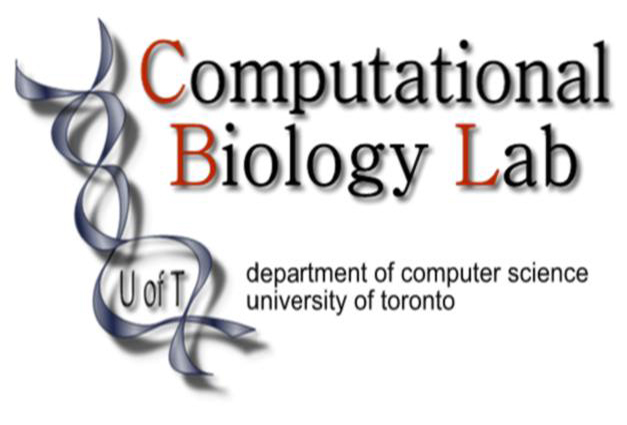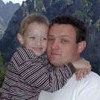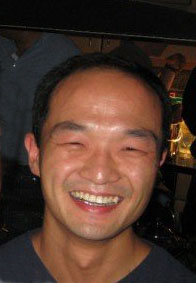

Quick menu:
Core Faculty:
 |
Gary Bader website: http://www.baderlab.org/ interests: biomolecular interaction networks and pathways, molecular profiles |
Gary works on biological network analysis and pathway information resources. He is involved in the development of the Cytoscape platform for network visualization and analysis, and also developed the Biomolecular Interaction Network Database (BIND).
|
|
 |
Michael Brudno website: http://www.cs.utoronto.ca/~brudno interests: comparative genomics, genome variation, algorithms, sequence assembly, population genetics |
Mike works on development of efficient algorithms for analyzing biological data, especially comparison of genomic and protein sequences and assembly of genomes. His biological interests include understanding of the variation between individuals in a species, especially in the Ciona intestinalis organism. He also collaborates with both computer scientists and biologists to improve the technology behind bioinformatics pipelines.
|
|
 |
Brendan Frey website: http://www.psi.toronto.edu/~frey/ interests: machine learning, probabilistic graphical models, alternative splicing, transcriptomics, genetic networks |
Brendan and his group group develop new computational machine learning tools and theoretical frameworks for analyzing large-scale data sets, with applications in molecular biology, computer vision, and sensory processing. The research focus of members of the group is on introducing principled algorithms that reveal hidden variables and efficiently take into account the structural knowledge that is critical in most real-world applications.
|
|
 |
Anna Goldenberg website: http://www.cs.toronto.edu/~goldenberg/ interests: machine learning, probabilistic graphical models, disease association, genetics, networks |
Anna works on developing new machine learning methods to uncover disease association and to refine disease phenotype by taking into account multiple sources of heterogeneous data. Her methods aim to learn the hidden structure in the population and in the genome variation. She collaborates with clinicians to reveal disease sub-types through data and statistical modelling driven hypotheses. Anna's previous research has focused on network modelling and she is still greatly interested in that area.
|
|
 |
Michael Hoffman website: http://pmgenomics.ca/hoffmanlab interests: epigenomics, chromatin, dynamic Bayesian networks, machine learning, gene regulation, cancer |
Michael develops machine learning techniques to better understand
chromatin biology. These models and algorithms transform
high-dimensional functional genomics data into interpretable patterns
and lead to new biological insight. He developed the Segway
semi-automated genome annotation method. His current research focuses on
application of machine learning to the epigenomics of human cancers,
especially acute myeloid leukemia, glioblastoma, and breast cancer.
|
|
 |
Igor Jurisica website: http://www.cs.utoronto.ca/~juris interests: representation, analysis, and visualization of high dimensional data generated from high-throughput biology experiments, cancer informatics, protein-protein interaction, gene expression profiling, high-throughput screens for protein crystallization |
Igor's research focuses on computational biology, and representation, analysis and visualization of high dimensional data generated by high-throughput biology experiments, in the context of Cancer Informatics. Of particular interest is the use of comparative analysis for the mining of integrated different datasets such as protein-protein interaction, gene expression profiling, and high-throughput screens for protein crystallization.
|
|
 |
Philip Kim website: http://www.kimlab.org interests: systems biology and functional / comparative genomics |
Philip's research focuses on systems biology and functional/comparative genomics. He is especially interested in complex cellular networks, the biophysics of protein interactions and human genetic variation, both in terms of single nucleotide changes and genome rearrangements. Philip takes on an integrative perspective on biology and develops approaches that straddle the interface between genomics, structural biology and network biology.
|
|
 |
Quaid Morris website: http://www.utoronto.ca/morrislab/ interests: gene function prediction, modeling gene regulatory networks, analysing large-scale biological datasets |
The focus of Quaid's research is the development and application of adaptive algorithms for analysing large-scale biological datasets. He is currently working in the areas of gene function prediction and modeling gene regulatory networks.
|
|
 |
Alan Moses website: http://labs.eeb.utoronto.ca/moses/ interests: genetic regulatory networks, evolution of regulatory systems, comparative genomics |
Alan works on computational and statistical methods to understand the organization and evolution of information in genome sequences. His main area of interest is in regulatory networks, but his research spans other areas of computational biology and molecular evolution as well.
|
|
 |
Frederick Roth website: http://llama.mshri.on.ca interests: designing and interpreting large-scale experiments to understand pathway structure and its relationship to phenotype and human disease |
|
|
|
 |
Zhaolei Zhang website: http://www.utoronto.ca/zhanglab/index.html interests: comparative genomics, evolutionary bioinformatics, analysis of regulatory elements, cellular databases |
|
|
|
People:
Department of Computer Science, 10 King's College Road, Toronto, ON, Canada M5S 3G4 | contact us | |